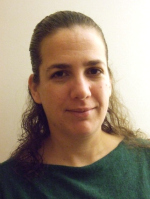
Dr. Ruth Perets is a 2011 Ann Schreiber Program of Excellence Grant Recipient. Her research is funded in part thanks to the support of The National Ovarian Cancer Coalition.
Sarah DeFeo: Tell me about yourself. Do you see yourself primarily as a physician, a scientist, or both?
Ruth Perets: I see myself as a physician first. I’m a medical oncologist, and I love it, but at times general medical oncology can be frustrating. It can feel like every day is the same. I love research because it allows me to be creative. I wanted to do more! As I was deciding to go to the US and focus only on research for a few years, someone from Dr. Ronny Drapkin’s lab at Dana-Farber came and spoke at my hospital in Israel. I was fascinated by her talk, and I thought “that’s what I want to do!”
SD: Had you treated many women with ovarian cancer in your practice in Israel?
Ruth Perets: I didn’t see many ovarian cancer patients because in Israel, ovarian cancer is treated by gynecologists—they handle the surgery and chemotherapy. I don’t think this is best for women, and I want to change it. Women need to get the best care possible. Treatments for ovarian cancer are getting more complex, and should be managed by someone with special training in treating cancer.
SD: Tell me about your research.
Ruth Perets: The lab I’m working in—Dr. Drapkin’s lab at the Dana-Farber Cancer Institute—is looking at the origins of ovarian cancer. We believe ovarian cancers may actually start in the fallopian tube, but that by the time they are diagnosed they have spread to the ovary. Right now, we only have circumstantial evidence to prove this—but we’re doing lab experiments to demonstrate that this is exactly what’s happening. There are two parts to my research, which are different, but connected. The first is looking at a protein called PAX8, which is present in both ovarian cancer and normal fallopian tubes, and investigating why it’s there and what it does. I’m also trying to build a mouse model of ovarian cancer. People have tried this before, but my approach is unique. I will genetically engineer a mouse to have human genetic mutations in the fallopian tube, but not in the ovary, to determine if such genetic alterations cause tumor development in the mouse. I hope that my findings will provide evidence for the hypothesis that fallopian tube cells are the origin of ovarian cancer.
SD: How do you hope your research will help women?
Ruth Perets: The theory that ovarian cancer comes from the tube must be proved beyond a doubt before clinical practice will change, but I hope we’ll get there. First, discovering where it comes may enable women with a predisposition to ovarian cancer to undergo better preventive screening and treatment. If we can show that most ovarian cancers come from the tube and not from the ovary, maybe at-risk women can keep their ovaries and just have their tubes removed. This is of special concern in Israel, where a huge number of ovarian cancer patients have hereditary risk factors, and managing that risk while taking quality of life into account is very challenging. Additionally, once I have the mouse model, I plan to make it available for pre-clinical testing of drugs, which could rapidly speed up drug development. Rather than trying everything on patients, we wouldn’t waste time on trials that have low chance of success, because we’d already know they don’t work in mice.
SD: It sounds like working with patients really motivates you.
Ruth Perets:Yes, very much so. Everything I do, I do for patients—there’s no other point! Treating ovarian cancer patients is very frustrating. Chemotherapy helps, but the cancer frequently comes back. When it does, it’s very hard, mostly for the patients, but also for me. In Israel we don’t have a lot of clinical trials like we do in the US. It’s been difficult when I’ve had nothing to offer patients. Current treatments aren’t acceptable to me, or to patients.
SD: In spite of the frustrations, do you feel hopeful for progress? Why?
Ruth Perets: Yes, I do. The fact is that we are in a completely different place than we were 10 years ago—but 10 years ago I wouldn’t have said the same thing. Things are changing rapidly now and we are racing forward at top speed. I think the introduction of PARP inhibitors has been really important because it proves that we can do less toxic, targeted therapies, and they can work! It should give patients hope that more progress is on the horizon– I know it motivates me. We may not “cure” cancer, but I think that eventually we’ll be able to prevent it, or to make it a manageable disease like diabetes or heart disease: diseases where patients can have high quality of life, with therapies that work.
SD: How do you think this grant from OCRF will impact your career?
Ruth Perets: It will be a huge help. This award helps position me as a more independent researcher in this field. As an award recipient, when I am applying for positions back in Israel, I can demonstrate that ovarian cancer is my field of expertise, with grants and (hopefully!) papers to back it up.
SD: Where do you see yourself in 5 years?
Ruth Perets: I know that I’ll be a physician specializing in the treatment of ovarian cancer patients. I also hope that I can bring more clinical trials to Israel, which are desperately needed. Finally, I hope that I will have a lab to continue my research, and that my mouse model will help the field make progress in the search for new and better drugs.
Ruth Perets, MD, PhD, is an Israeli physician-scientist. She graduated from the Hebrew University Medical School in Jerusalem and is doing a medical oncology residency in the Sheba Hospital Cancer Center in Israel. She earned a Masters degree in cancer research from the Hebrew University and earned her PhD from the Hebrew University. Dr. Perets has taken a leave of absence from her residency to do a post-doctoral fellowship in the Drapkin lab at the Dana-Farber Cancer Institute in Boston. She hopes to be able to combine clinical work and the knowledge gained from her research back in Israel, while continuing to carry on this cutting edge research on ovarian cancer pathogenesis.


